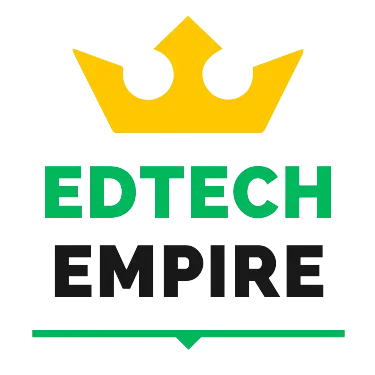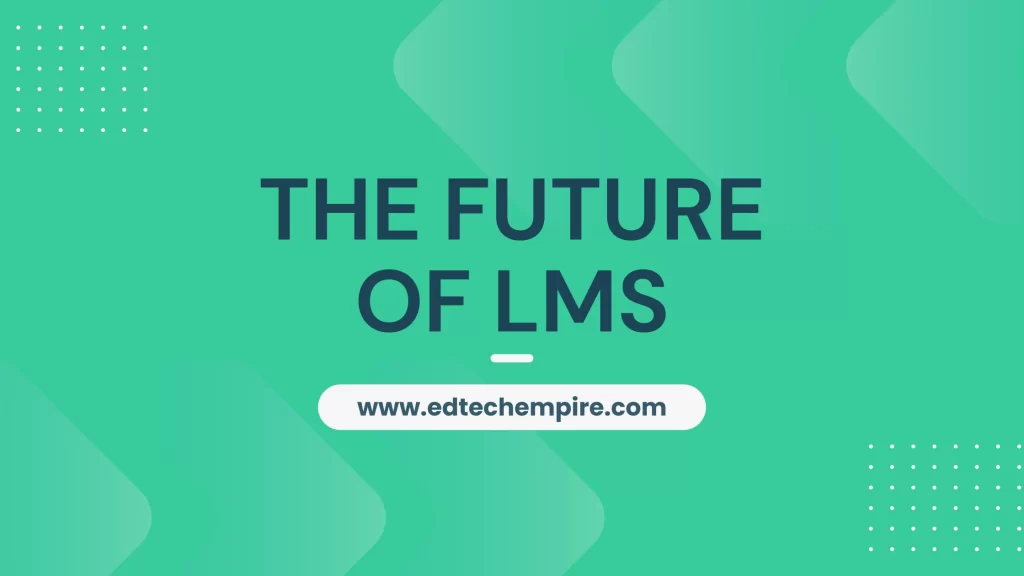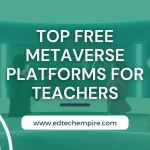![]()
It’s no surprise that the world of education is constantly evolving as technology advances at an exponential rate. The Learning Management System is an important tool that has played an important role in the evolution of education (LMS). This blog will discuss the future of learning management systems in the light of the current developments and their future prospects.
For those who are unfamiliar with the term “Learning Management System,” or “LMS”, it is essentially a digital platform that allows teachers to create and deliver course content, track student progress, and facilitate communication and collaboration among classmates. In a nutshell, it’s a one-stop shop for everything related to a particular course or program of study.
However, to many, it is not a new topic anymore because the need of LMS grew rapidly during the COVID-19 Pandemic. To remain prepared, educators now need to focus more on what the future holds for LMS and the trends on how it is being used along with the changes that may come due to further development of different technologies. Let’s take a look at some emerging LMS trends and how they might shape the future of education.
Artificial Intelligence (AI) and Machine Learning in LMS
The use of artificial intelligence (AI) and machine learning is one trend that is already making waves in the world of LMS. These technologies, in essence, enable LMSs to become smarter and more personalized over time as they learn from the data they collect.
Some learning management systems, for example, are now using AI and machine learning algorithms to provide personalized recommendations to students based on their interests and learning history. This can assist students in discovering new resources and content that they might not have discovered otherwise, resulting in a more tailored and engaging learning experience.
AI and machine learning can also be utilized to create adaptive learning experiences within a learning management system. This means that course material and assessments can be changed in real-time based on a student’s progress and performance resulting in a more personalized and efficient learning experience. Take a look at our blog post about ChatGPT, an AI chatbot that can be used in education to create personalized learning content.
Virtual and Augmented Reality in LMS
The use of virtual reality (VR) and augmented reality (AR) to build an immersive and interactive educational experience is another exciting trend in LMS. While virtual reality and augmented reality have long been used for games and entertainment, they are now making their way into the world of teaching and learning as well.
Imagine exploring a virtual museum or taking a virtual field trip to a distant location from the comfort of your own home. Consider being able to interact with 3D simulations and models in a science class, bringing concepts to reality in ways that traditional methods simply cannot. These are just a few of the possibilities presented by VR and AR.
While VR and AR technology are still in their infancy, it is clear that they have the potential to transform the way we learn and interact with educational content.
Metaverse in LMS
Metaverse is a more advanced and new concept that capitalizes on the use of virtual reality. The concept of the metaverse, or virtual shared space where users can engage with each other as well as virtual objects and environments, is an exciting potential development in the world of LMS. Consider it a virtual reality version of the internet, with users able to connect and collaborate in a fully immersive and interactive environment.
The incorporation of the metaverse in LMS has the potential to fundamentally alter how we learn and interact with educational content. Imagine attending virtual lessons or study groups with fellow students from all over the world, or even taking virtual field trips to exotic locations without ever leaving your living room. The possibilities are endless, and the metaverse has enormous potential to revolutionize education.
While the metaverse concept is still in its infancy, it is clear that it has the potential to be a game changer in the worlds of LMS and education. It will be interesting to see how this technology evolves and how it can be used to improve learning in the future.
Microlearning and LMS
Microlearning is another trend that is getting momentum in the world of LMS. Simply put, microlearning is the process of dividing larger chunks of information into smaller, more manageable units. This is especially beneficial for students who do not have the time or energy to sit through lengthy lectures or readings.
Microlearning can take many different forms, including short videos, interactive quizzes, or even a few bullet points summarizing key concepts. Students can absorb and retain new information more easily when it is broken down into smaller pieces, resulting in a more efficient and effective learning experience.
The Future of LMS
So, what does the future of LMS hold? It’s difficult to say for certain, but it’s clear that the use of AI, VR/AR, and microlearning is all long-term trends. As technology advances, we can expect to see even more exciting and innovative advancements in the world of LMS.
One thing is certain: the tools and technologies we use to facilitate learning will shape the future of education in large part. And LMS will undoubtedly play a significant role in this future.
As a result, whether you’re a student, educator, or administrator, it’s important to stay up to date on the latest LMS trends and how they may affect your educational experiences. Who knows what the future holds, but one thing is certain: the use of Learning Management Systems (LMS) will only grow and evolve in the coming years.
Conclusion
To summarize, the future of Learning Management Systems (LMS) appears promising. LMS has the potential to change the way we learn and interact with educational content by utilizing new technologies such as AI and VR. While it is challenging to predict the future, it is clear that Learning Management Systems (LMS) will continue to play an important role in education. So, whether you’re a student, teacher, or administrator, staying up to date on the latest trends in LMS and how they may affect your learning experience is critical.
If you like this blog post, you may also like our guidelines on how to create educational videos for students which you can use in Learning Management Systems to facilitate the learning of the students.




Pingback: how to Incorporate Technology into Lesson Plans - Edtech Empire